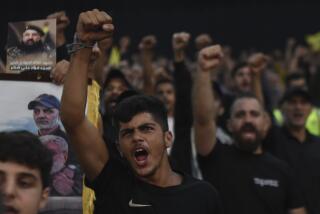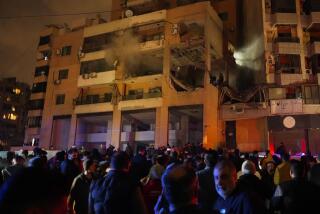Israeli War Hero Mordechai Gur Dies at 65 : Mideast: Deputy defense chief apparently shot himself after battling cancer for several years.
- Share via
JERUSALEM — Thousands of members of Israel’s military and political elite turned out Sunday to bury Deputy Defense Minister Mordechai Gur, a war hero who apparently shot himself to death.
Gur, 65, had battled cancer for several years. The former army chief of staff was found in the garden of his Tel Aviv home Sunday morning, his pistol by his side. He left a letter saying he did not want to become a burden on his family.
His apparent suicide shocked Israelis, few of whom were aware of the seriousness of Gur’s illness.
Gur is best remembered here as the leader of the paratroop brigade that captured Jerusalem’s Old City during the Arab-Israeli War of June, 1967. On Sunday, Israel Radio played tapes of an excited Gur and his commanders speaking during that operation.
“The Temple Mount is ours! The Temple Mount is ours!” Gur could be heard shouting into his radio. His triumphant outburst captured the imagination of Israelis and of Jews around the world, who saw the taking of the Temple Mount, where the Temple of Solomon once stood, as the ultimate symbol of the Jewish people regaining their homeland.
Gur and the troops he commanded during that operation were instantly elevated to the status of heroes for their role in returning the Western Wall--the last remnant of the ancient temple--to the Jewish people. Although in later years military analysts questioned the assault on the Old City because it exacted a high toll of Israeli casualties, Gur’s reputation as a bold and daring commander remained untarnished.
Gur was one of a handful of men--most of them fellow soldiers--whom Prime Minister Yitzhak Rabin has regarded as close friends. The taciturn Rabin led his Cabinet in observing a minute of silence honoring Gur at the start of its regular weekly meeting Sunday.
“Motta was a special man,” Rabin said, using the nickname by which all Israelis knew Gur. “He was sensitive and strong, a soldier and a civilian, a lover of books and writing, and above all, a friend whom you know would always be there for you.”
Gur’s military career was followed by a series of frustrations as he pursued a political career in the Labor Party. He was never able to achieve his dream of becoming defense minister--a post Rabin kept for himself when he became prime minister in 1992. Rabin appointed Gur deputy defense minister and consulted with him often, but made all the important policy decisions on making peace with the Palestinians and negotiating with Syria with little input from Gur.
“He wasn’t a politician,” said hawkish former Defense Minister Ariel Sharon, of the opposition Likud Party, who served on the battlefield with Gur. “When I looked at him, I remembered other days, days of fighting. I saw him as a warrior, as a man of principles.”
More to Read
Sign up for Essential California
The most important California stories and recommendations in your inbox every morning.
You may occasionally receive promotional content from the Los Angeles Times.












